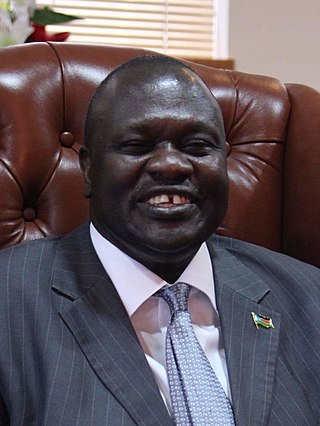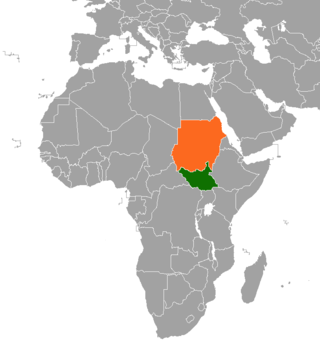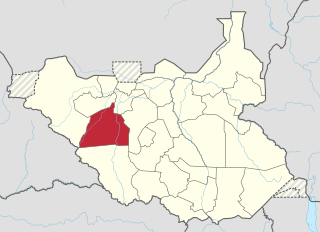Contents
| |||||
| Decades: | |||||
|---|---|---|---|---|---|
| See also: | |||||
Events in the year 2016 in South Sudan .
| |||||
| Decades: | |||||
|---|---|---|---|---|---|
| See also: | |||||
Events in the year 2016 in South Sudan .

South Sudanese Civil War continues.

Riek Machar Teny Dhurgon is a South Sudanese politician who has served as the First Vice President of South Sudan since 2020.

Wau is a town, locally referred to as a city, in northwestern South Sudan on the western bank of Jur River It is the capital of Western Bahr el Ghazal region in South Sudan. It lies approximately 650 kilometres (400 mi) northwest of the capital, Juba. It is a diverse small urban center (town) and a trading hub. The city has been a municipality since 2012 and is governed by a mayor who the state governor usually appoints. The city comprises several neighborhoods including Nazareth, Hai Fahal, Sika Hadid, and Daraja.

Southern Sudan was an autonomous region consisting of the ten southern states of Sudan between its formation in July 2005 and independence as the Republic of South Sudan in July 2011. The autonomous government was initially established in Rumbek and later moved to Juba. It was bordered by Ethiopia to the east; Kenya, Uganda, and the Democratic Republic of the Congo to the south; and the Central African Republic to the west. To the north lies the predominantly Arab and Muslim region directly under the control of the central government. The region's autonomous status was a condition of a peace agreement between the Sudan People's Liberation Army/Movement (SPLA/M) and the Government of Sudan represented by the National Congress Party ending the Second Sudanese Civil War. The conflict was Africa's longest running civil war.

South Sudan, officially the Republic of South Sudan, is a landlocked country in East Africa. It is bordered on the north by Sudan; on the east by Ethiopia; on the south by the Democratic Republic of the Congo, Uganda and Kenya; and on the west by the Central African Republic. South Sudan's diverse landscape includes vast plains and plateaus, dry and tropical savannahs, inland floodplains, and forested mountains. The Nile River system is the defining physical feature of the country, running south to north across its center, which is dominated by a large swamp known as the Sudd. South Sudan has a population of 12.7 million. Juba is the capital and largest city.

The South Sudanese pound is the currency of the Republic of South Sudan. It is subdivided into 100 piasters. It was approved by the Southern Sudan Legislative Assembly before secession on 9 July 2011 from Sudan.

The Republic of South Sudan became independent on 9 July 2011 from Sudan and issued its first stamps on 13 July 2011. Only almost three months later, on 4 October 2011, did South Sudan become a member of the Universal Postal Union (UPU). Before independence, South Sudan used stamps issued by Sudan. The Directorate of Postal Services of the Ministry of Telecommunication and Postal Services is responsible for postal affairs in South Sudan.
Established by the Bank of South Sudan Act of 2011, the Central Bank of South Sudan is statutorily mandated to regulate the operations of all financial institutions in the country, including commercial banks. The Central Bank fulfills this mandate by issuing prudential guidelines and regulations as provided for under the Act. In theory, the licensed commercial banks are obligated to operate in accordance with these laws and guidelines, but many suggest this is not happening.
Ethnic violence in South Sudan has a long history among South Sudan's varied ethnic groups. South Sudan has 64 tribes with the largest being the Dinka, who constitute about 35% of the population and predominate in government. The second largest are the Nuers. Conflict is often aggravated among nomadic groups over the issue of cattle and grazing land and is part of the wider Sudanese nomadic conflicts.

The Heglig Crisis was a brief war fought between the countries of Sudan and South Sudan in 2012 over oil-rich regions between South Sudan's Unity and Sudan's South Kordofan states. South Sudan invaded and briefly occupied the small border town of Heglig before being pushed back by the Sudanese army. Small-scale clashes continued until an agreement on borders and natural resources was signed on 26 September, resolving most aspects of the conflict.
The South Sudan National Cup is an annual knockout association football competition in men's domestic South Sudanese football. Organized by the South Sudan Football Association, the cup began in 2012, not long after South Sudan gained independence.

The South Sudanese Civil War was a multi-sided civil war in South Sudan fought from 2013 to 2020, between forces of the government and opposition forces. The Civil War caused rampant human rights abuses, including forced displacement, ethnic massacres, and killings of journalists by various parties. Since its end South Sudan has been governed by a coalition formed by leaders of the former warring factions, Salva Kiir Mayardit and Riek Machar. In 2024, the country continues to recover from the war while experiencing ongoing and systemic ethnic violence.
The following lists events that happened during 2011 in South Sudan.

Wau State was a state in South Sudan that existed between 2 October 2015 and 22 February 2020. It was located in the Bahr el Ghazal region, and was part of the former state of Western Bahr el Ghazal. Wau State bordered Aweil State, Gbudwe State, Gogrial State, Lol State, and Tonj State.
Arkangelo Barri Wanji was a South Sudanese politician of the Sudan People's Liberation Movement. He was a member of the National Legislative Assembly since its inception in 2011. He was previously a member of the predecessor institute, the Southern Sudan Legislative Assembly, to which he was elected in the 2010 South Sudanese general election.

Armed clashes took in Wau State from late June 2016 to January 2019 between the Dinka-dominated Sudan People's Liberation Army (SPLA) and local opposition forces, consisting of tribal Fertit militias as well as fighters claiming allegiance to Riek Machar. It is unclear to what extent these rebels were actually part of the SPLM-IO or acting independently while using the SPLM-IO's name. The clashes resulted in the arrest of the state's governor, Elias Waya Nyipuoc, widespread death and destruction in the state capital, Wau town, and the displacement of up to 150,000 people.
Islah Football Club is a South Sudanese federation soccer club professionally known as Islah or Sejune otherwise Sijn, currently based in Aweil, South Sudan. Islah, Sejune and Sijn are Arabic words which are translated to English as "prison". It was established on February 4, 2010, by Aweil Prison Service (APS), so it is rumoured as governmental soccer club. It shares Aweil Stadium with various teams namely Tuek Tuek, Madiria, Apada, Ayat Stars, Merreikh Aweil, Salaam Aweil and Aweil Stars. It participates in the South Sudan Premier League, South Sudan National Cup and South Sudan Football Championship. Islah is one of the victorious teams of South Sudan.
Mathiang Anyoor, also spelled Mathiang Anyur, also known as Dot Ke Beny, is a Dinka-affiliated militia group in South Sudan. Originally an ad-hoc volunteer force founded in 2012, the militia was transformed into a private army to protect President Salva Kiir Mayardit and army chief Paul Malong Awan. However, the South Sudanese military (SPLA) claims that it is just another battalion. Much of the ethnic violence against non-Dinkas in the South Sudanese Civil War is attributed to the militia.
Events in the year 2018 in South Sudan.
The 2014 retreat from Western Bahr el Ghazal, also called the long march north, was an unorganized withdrawal by hundreds of Nuer Sudan People's Liberation Army (SPLA) deserters who sought to flee from Bahr el Ghazal to Sudan during the South Sudanese Civil War. After longstanding tensions between SPLA soldiers belonging to the Dinka and Nuer ethnic groups escalated on 25 April 2014, leading to a massacre of Nuer soldiers at Mapel in Western Bahr el Ghazal, a large number of Nuer SPLA soldiers deserted to escape ethnic prosecution and loyalist SPLA forces. Though some deserters joined SPLM-IO rebels or surrendered to the government, a large number of them marched northward, joined by other SPLA defectors from Northern Bahr el Ghazal. After covering over 400 kilometres (250 mi), this trek eventually arrived in Sudan on 4 August 2014, where they were disarmed.
This article lists events from the year 2019 in South Sudan